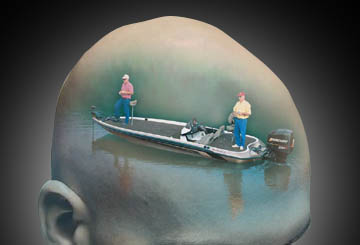Levels of the Game: Review and rework

Competitive anglers typically go through an annual process of re-evaluating both fishing goals and angling techniques. For most of us, the offseason is a good time to review last year’s successes and failures and to recognize our recurrent mistakes. Breaks in tournament schedules allow us to create new goals and then develop plans to improve.
However, great anglers, like top athletes in other sports, rarely wait until the end of their season to make adaptive changes. If a Jay Yelas, a Larry Nixon or a Luke Clausen has a bad tournament, he is likely to immediately sit down, look at what happened and figure out what needs to change. This month’s column will give the beginner, the intermediate competitor, and the advanced tournament angler advice and suggestions on how to best deal with performance problems midseason.
Beginner level
If you are just starting to fish tournaments, you probably want to ignore what I just said about making midseason changes and instead heed this advice for rookies: Don’t try to change too much too soon. Here’s why. Let’s say that, after the first couple of tournaments, you find yourself in the bottom half of the standings (or worse yet on the bottom). A poor showing or two early in the season does not mean that you should abandon what you know and have been trying to do. Instead, you should accept the fact that you really are a rookie and that, like other rookies, you can’t be expected to do exceptionally well right off the bat. Anglers new to the competitive fishing scene need to fish several events, paying attention to what works and what doesn’t, and learning as much as they can about lake types, seasonal patterns and specific techniques.
Fundamentally, your primary goal should be to learn, not to win. If you happen to hit on a hot technique, or by chance and preparation you stumble on the mother lode of fish and finish high in the standings, good for you! However, expecting to match the performance of the senior members of your club or circuit will most likely result in excessive frustration. At worst you can end up doing what I did when I first began fishing tournaments: abandoning the few techniques I knew well in favor of the bait that won the last event. I can hear you chuckling as you envision what that looked like. It’s funny even to me now, though it wasn’t then!
As a beginning competitive angler, think of adding techniques rather than replacing them. At this point you may be building your effectiveness with spinnerbaits, clearly a key bait to master, only to find that today’s tournament was won on deep crankbaits. OK, well, if the next tournament you fish also has a deep bite, maybe you want a few 15-foot-plus cranks with you; or maybe you want to figure out how to fish the spinnerbaits you’re confident in at a deeper level.
Intermediate level
After fishing the tournament circuit for a few years, you will by now have built confidence in certain baits and lake patterns, and you also have some idea of what you do well and where you are not strong. For intermediates, each event does become an opportunity to further hone your skills. However, the key here is to not rush to judgment or be presumptuous. You have likely seen this phenomenon yourself, wherein a small amount of information leads to inaccurate assumptions and false conclusions.
Not long ago in a regional event, a disappointed angler was heard to say, “Boy, I sure learned my lesson today. We fished that rock pile for six hours, and when we left, the guys who won the tournament came in and just smoked `em! Next time I’ll know better, and we’ll stay and wait for them to turn on.” As is likely apparent, there are several flaws in this line of reasoning, which are clear to you and me because we didn’t bomb in that event!
However, as you collect information about tournament winners and compare what they did to your performance, take your time, ask lots of questions, and think through several possibilities. Was the difference primarily location, bait type, time of day or speed of retrieve? Or was something more subtle at work such as cloud cover, current or water temperature? Critique your performance, yes, but jump to premature conclusions at your own risk.
Advanced level
You are now comfortably skilled with many competition-tested methods and patterns. If you have a strong enough character, you may be able to critically step back and fully evaluate yourself and your mental approach to tournament settings. This is not for the faint of heart, however. An individual needs to be genuinely poised and self-assured in order to engage in accurate self-assessment. Put another way, it’s not emotionally easy to objectively examine and criticize your own psyche. It’s way easier to find some external event to focus on, or blame, if you have a poor showing.
Top competitors, however, are mentally strong enough to look inside themselves. Let me give you an example. Not so long ago, one competitive team I know was floundering. After a subpar performance in the first tournament of the season, they were struggling with the lake, with the fish and with each other halfway through the second event. One member of the team suddenly said, “That’s it! I quit!” So they tossed their fish back, put the boat on the trailer and zeroed for the event.
After having a couple of days to calm down, the hot-head angler did a searching self-examination with, I might add, the assistance of a well-trained psychologist! In vivid detail, he described how he and his partner got together and laid all their concerns on the table. They openly talked through how they had not been working as a team, and they discussed options for how they might better collaborate. They agreed on a strategy whereby each angler would fish his strengths, and they further committed to being helpful and encouraging rather than critical of each other.
The team approached their final three events with a renewed sense of purpose and a much calmer, tolerant, go-with-the-flow attitude. In spite of mechanical difficulties in consecutive tournaments, the team finished first, second and first to end the season!
Was their success exclusively due to a revamped mental attitude? Of course not. In most cases, like this one, a constructive, positive, flexible mental attitude is a necessary, but not sufficient, condition for success. Several other things had to fall into place, obviously, for this team to do so well. However, it is also equally likely that they would not have realized this level of success without that midseason mental overhaul.
As your tournament circuit unfolds this year, pay attention to what you are doing well, and see also if you can’t use the information in this article to make a couple of mental improvements before you step up to the last weigh-in.

————————————————–
Jay T. McNamara, Ph.D., L.P., also known as Dr. Fish, recently finished his book “The Psychology of Exceptional Fishing.” You can order it by contacting Jay via e-mail at this address: [email protected].
————————————————–
Jay T. McNamara, Ph.D., L.P., is a psychologist, who is also an avid bass and walleye angler. With more than 26 years of professional experience complemented by participation in competitive fishing at local and national levels, he is uniquely qualified to illustrate how performance psychology principles apply to tournament fishing.